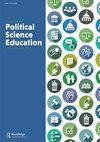An Argument for Integrative Learning Within Political Science: Rethinking an Undergraduate Course in European Government and Politics
IF 0.6
Q3 POLITICAL SCIENCE
引用次数: 0
Abstract
Abstract Political science is ideally positioned to advance integrative learning, an initiative in higher education that fosters students’ abilities to integrate different fields of study in exploring complex real world problems. This essay focuses on ways integrative learning can be incorporated into undergraduate political science classes by developing a narrative of revisions to the curriculum of an introductory European government and politics course. Center the position of the Muslim immigrant experience in Europe while promoting an integrative form of political science that crosses subfields within the discipline, and integrates differing modes of inquiry invites students to think critically about immigration, the rise of the populist right, Liberalism and its limits, and the future of European integration. While this redesigned focus, I suggest, provides a useful model for rethinking approaches to the teaching of European politics, the main focus of the article is on promoting the foregrounding of integrative learning course design practices that can be adapted to other introductory undergraduate political science classes.关于政治学综合学习的争论——对欧洲政府与政治学本科课程的反思
政治科学的理想定位是促进综合学习,这是高等教育中的一项倡议,旨在培养学生在探索复杂的现实世界问题时整合不同研究领域的能力。本文通过对欧洲政府与政治导论课程的修订叙述,重点探讨了将综合学习纳入本科政治学课程的方法。以欧洲穆斯林移民经历的地位为中心,同时促进跨学科子领域的政治科学的综合形式,并整合不同的探究模式,邀请学生批判性地思考移民,民粹主义权利的兴起,自由主义及其局限性,以及欧洲一体化的未来。我认为,虽然这种重新设计的重点为重新思考欧洲政治教学方法提供了一个有用的模型,但本文的主要重点是促进整合学习课程设计实践的前景,这些实践可以适用于其他本科政治学入门课程。
本文章由计算机程序翻译,如有差异,请以英文原文为准。
求助全文
约1分钟内获得全文
求助全文
来源期刊

Journal of Political Science Education
POLITICAL SCIENCE-
CiteScore
1.80
自引率
36.40%
发文量
69
期刊介绍:
The Journal of Political Science Education is an intellectually rigorous, path-breaking, agenda-setting journal that publishes the highest quality scholarship on teaching and pedagogical issues in political science. The journal aims to represent the full range of questions, issues and approaches regarding political science education, including teaching-related issues, methods and techniques, learning/teaching activities and devices, educational assessment in political science, graduate education, and curriculum development. In particular, the journal''s Editors welcome studies that reflect the scholarship of teaching and learning, or works that would be informative and/or of practical use to the readers of the Journal of Political Science Education , and address topics in an empirical way, making use of the techniques that political scientists use in their own substantive research.
 求助内容:
求助内容: 应助结果提醒方式:
应助结果提醒方式:


